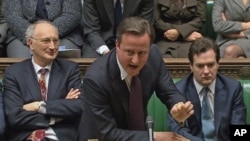European leaders took steps to deal with some of their long term financial problems at a summit in Brussels last week. But they are moving ahead without one of the continent's largest economies Britain, and they left some important problems unresolved.
It was a long night of negotiating at European Union headquarters in Brussels, lasting well past midnight.
Inside, the 27 European leaders tried to negotiate new fiscal rules. But in the end, British Prime Minister David Cameron vetoed the deal, leading to some apparently frosty moments with French President Nicolas Sarkozy and other leaders.
The man who chairs EU summits explained what happened.
"The 17 member states of the euro zone and already many others are committed to a new fiscal compact, " said Cameron. "It is about more fiscal discipline, more automatic sanctions, stricter surveillance."
But Britain won't participate. Back in London, Cameron defended his decision at a typically raucous session of parliament.
"Frankly I have to tell the house, the choice was a treaty without proper safeguards or no treaty and the right answer was no treaty," said Cameron. "It was not an easy thing to do, but it was the right thing to do."
Cameron said he vetoed the plan, preventing it from becoming official EU policy, because it would have hurt Britain's important financial services industry and given too much power over the British budget to bureaucrats in Brussels.
As expected the move was not welcomed by the opposition leader.
"He has given up our seat at the table," Edward Miliband said. "He has exposed, not protected, British business. And he has come back with a bad deal for Britain."
Somewhat less expected was criticism from Cameron's coalition partner and deputy prime minister, Nick Clegg.
"I think isolation in Europe, when we are one against 26 is potentially a bad thing for jobs, bad thing for growth and a bad thing for the livelihoods of millions of people in this country," said Clegg.
Britain has previously excluded itself from the common euro currency and refused to join the EU's open-borders agreement. But it still manages to be an influential member of the group. Cameron says the decision to allow the others to go ahead with new fiscal rules will be no different.
"When it comes to things like defense, we are the key European member of NATO," noted Cameron. "When it comes to the single market, we're probably the most respected voice in the European Union. But when it comes to the eurozone, should we really argue we have to be at every meeting where they discuss the euro?"
But some analysts say the decision will leave Britain on the outside of important discussions that will affect its key trading partners in Europe during this economically fragile period. Among them is Mujtaba Rahman of the Eurasia Group risk assessment firm.
"The UK is in effect now completely isolated," said Rahman. "In effect, he's out in the cold and it's going to make the UK's relationship with the EU going forward much more complicated, much more precarious."
And the top EU economics official says British banks and brokers will not escape tighter regulation designed to avoid a repeat of the current crisis.
"That's not going to happen," said EU Economics Commissioner Olli Rehn.
More importantly, according to Jennifer McKeown of Capital Economics, the EU leaders didn't do enough to solve their main problems at the summit - which she says are lack of competitiveness and slow growth.
"We're now forecasting that Greece will leave the eurozone next year," said McKeown. "And we think there's a good possibility that some other small economies follow it, perhaps in 2013. At the moment, we've penciled in the departure of Portugal and perhaps Ireland, too."
So for all the intra-Europe tension, and all the fallout back in Britain, the EU leaders may have only calmed the financial markets partly and temporarily. Early next year, when some of the continent's troubled economies need to borrow more money, some analysts say the crisis atmosphere could easily return.
European Summit Splits Bloc, May Not Solve Problems
- By Al Pessin




